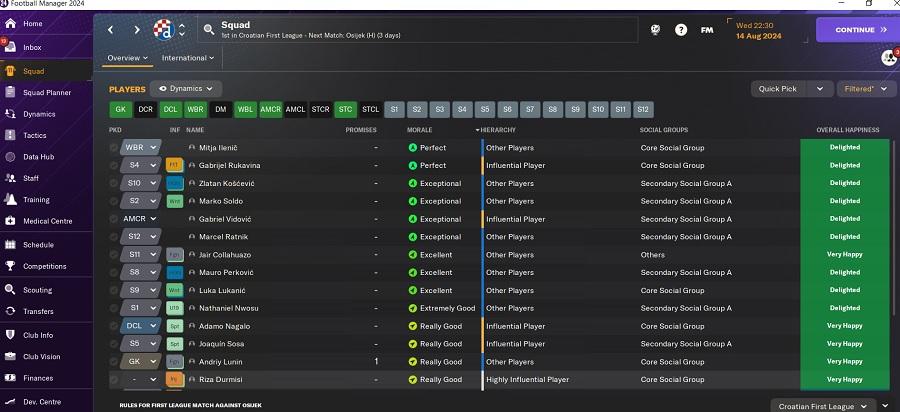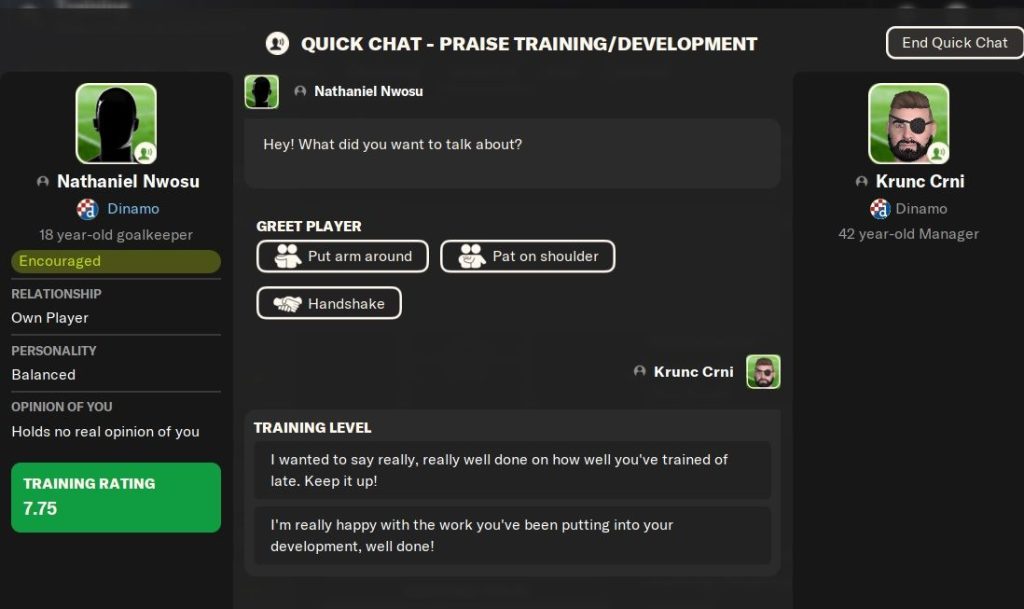Copyright © 2018-2024 nothrow.com. All Rights Reserved. You may not copy and distribute the content from the Site.
Morale influences everything from individual player performance to team cohesion, impacting your journey towards victory.
In real-world football, as in Football Manager, the emotional and psychological state of your players is a pivotal factor in achieving success.
Through this guide, we aim to equip you with strategies, tips, and insights to master the art of morale management, transforming your team into a formidable force on the virtual pitch.
FM 2024 Essential Morale-Boosting Tips
- Applauding Players with Good Training Scores Weekly: Regular recognition of players’ efforts in training can significantly boost their morale. It shows that you’re paying attention to their hard work and progress, which can be very motivating.
- Praising Players with Ratings Above 7.0 After Each Match: Acknowledging good performances in matches reinforces positive behavior and encourages players to maintain high standards. It also helps in building confidence.
- Fulfilling Promises: Keeping your promises to players is crucial for maintaining trust and respect. Breaking promises can lead to decreased morale and even disrupt the dressing room atmosphere.
- Scheduling Friendly Games with Weaker Opponents: Winning games, even friendlies, can boost morale. Playing against weaker teams increases the chances of winning, which can help build a winning mentality and improve team cohesion.
- Good Prize Money for Achievements: Financial incentives can be a strong motivator. Setting attractive rewards for achieving goals can drive players to perform better.
- Holding Press Conferences: Your interactions with the media can affect team morale. Speaking positively about your team and players in press conferences can boost their morale, while negative comments might have the opposite effect.
- Encouraging Players During the Game: Positive encouragement during matches can uplift players, especially when they’re under pressure. It shows your support and belief in their abilities.
- Praising Player Conduct: Regularly speaking to each player and praising their conduct helps in building strong relationships. It shows that you value not just their performance on the pitch but also their overall contribution to the team environment.
- Utilize Player Groups: Identify and nurture key player groups within your squad. Influential players can help spread positive morale. Consider the social dynamics when signing new players – how they fit into these groups can impact overall team morale.
- Celebrate Milestones: Acknowledge and celebrate player milestones, like 100th appearances or goal-scoring records. This can be done in team meetings or through the media.
- Mentoring Groups: Create mentoring groups in the ‘Training’ section under ‘Mentoring’. Pairing younger players with experienced ones can improve their development and team cohesion, positively impacting morale.
- Manage Playing Time Fairly: Ensure that players get adequate playing time based on their status in the team. This is crucial for keeping backup and rotation players happy.
Understanding the Basics
Team morale in Football Manager is a dynamic and influential aspect of the game. It represents the collective mood and spirit of your team, impacting player performances, team cohesion, and even the outcome of matches.
Morale is affected by a variety of factors, from individual player interactions to broader team successes and failures.
Why Morale Matters
High morale can lead to improved performances on the pitch, with players more likely to execute your tactical plans effectively.
Conversely, low morale can lead to poor performances, increased likelihood of mistakes, and even conflicts within the team. Understanding and managing morale is key to long-term success in Football Manager.
The Building Blocks of High Morale

1. Effective Communication with Players
Regular, meaningful interactions with your players are essential.
This includes discussing their concerns, providing feedback on their performances, and understanding their personal goals and ambitions within the team.
2. The Impact of Team Meetings
Team meetings are a powerful tool for addressing the squad as a whole.
They can be used to boost morale, set objectives, and even resolve conflicts. The key is to choose the right tone and message for the current situation.
3. Recognizing and Rewarding Performance
Acknowledging and rewarding good performances, whether in matches or training, can significantly boost a player’s morale.
This can be through public praise, bonuses, or even just a private word of encouragement.
Tactical Approaches to Boost Morale
Match Day Strategies
Your approach to matches can affect team morale.
A string of losses can dampen spirits, while an unexpected win can boost morale significantly. Tailoring your tactics to not only win games but also to play in a style that suits your team’s strengths can keep morale high.
Training Regimens and Their Impact
Training schedules should balance intensity with rest, and be tailored to both the team’s and individual player’s needs.
Overtraining can lead to fatigue and injuries, negatively impacting morale, while undertraining can lead to poor match preparedness.
Managing Player Expectations and Promises
Be mindful of what you promise to your players.
Failing to deliver on promises can lead to significant drops in morale. This includes promises about playing time, contract improvements, or the team’s direction.
The Role of Team Dynamics

Understanding Player Personalities
Each player in Football Manager has a unique personality that influences how they respond to various situations.
Understanding these personalities helps in tailoring your approach to individual players, thereby positively affecting their morale and the team’s overall dynamics.
The Importance of Team Leaders
Team leaders and influential players can significantly impact the morale of the squad.
Identifying and nurturing these leaders can help in maintaining a positive dressing room atmosphere and can be crucial during challenging times.
Nurturing Young Talent
Young players require special attention to keep their morale high.
Balancing their game time, providing mentorship, and gradual integration into the first team are key strategies to ensure their development and maintain high morale.
Overcoming Challenges
Dealing with Losing Streaks
Losing streaks can severely impact team morale.
Addressing this involves a mix of tactical changes, motivational team talks, and sometimes altering training routines to regain form and confidence.
Handling Player Discontent
Player discontent can arise from various issues like lack of playing time or contract disputes.
Addressing these issues promptly and effectively is crucial to prevent a negative impact on the wider team morale.
Balancing Squad Rotation
Effective squad rotation helps in keeping players fresh and morale high.
It’s important to manage players’ game time, especially during congested fixture periods, to maintain a happy and competitive squad.
Advanced Techniques for Morale Management

Utilizing Staff and Facilities
Leveraging the expertise of your coaching staff and the facilities at your disposal can have a positive impact on morale.
This includes specialized training programs and utilizing sports psychologists.
The Psychological Aspect of Player Management
Understanding and managing the psychological aspects of your players is a nuanced but vital part of morale management.
This includes managing egos, addressing personal player concerns, and creating a supportive team environment.
Adapting to Different Scenarios
Different scenarios, such as cup runs or relegation battles, require different management approaches.
Adapting your strategy to suit these scenarios can help in keeping the team morale high in various situations.
Keeping Morale High Throughout the Season
Long-Term Morale Strategies
Developing and implementing long-term strategies for maintaining high morale is crucial.
This includes setting season objectives, managing player career progression, and creating a positive club culture.
Preparing for Key Matches
Key matches, such as derbies or crucial league games, require special preparation.
Tailoring your approach to these games can help in boosting morale and achieving positive results.
End-of-Season Reflections
End-of-season reflections and debriefs can help in assessing the team’s morale over the season.
This is a time to celebrate successes, learn from failures, and plan for the next season.
Conclusion and Final Thoughts
As we’ve explored, managing team morale in Football Manager is a multifaceted challenge that requires a blend of tactical acumen, psychological insight, and effective communication.
The key to success lies in understanding the unique dynamics of your team, adapting to various situations, and maintaining a balance between player needs and team objectives.
By employing the strategies discussed, from effective player management to adapting to different scenarios, you can foster a positive team environment that leads to success both on and off the virtual pitch.
Remember, the best managers in Football Manager, much like in real life, are those who master the art of morale management, turning challenges into opportunities and fostering a winning mentality within their squad.
Key Facts About Improving Squad Morale:
- ✅ Effective communication and regular team meetings are crucial for understanding and addressing player concerns, directly influencing team morale.
- ✅ Tactical decisions, including match strategies and training schedules, play a significant role in maintaining high morale and player satisfaction.
- ✅ Understanding player personalities and dynamics, including the influence of team leaders, is essential for creating a harmonious and motivated team.
- ✅ Overcoming challenges such as losing streaks and player discontent requires a balanced approach to squad rotation and individual player management.
- ✅ Long-term strategies for maintaining high morale throughout the season include utilizing staff, facilities, and adapting to different scenarios and matches.
FAQs on Boosting Team Morale in Football Manager
How do I quickly improve team morale after a series of losses?
Focus on positive team talks, schedule easier friendly matches to secure wins, and consider giving players some rest to recover from the mental fatigue of losing.
Can individual player interactions significantly impact overall team morale?
Yes, individual interactions, especially with key players and team leaders, can have a ripple effect on the entire team’s morale.
What role does squad rotation play in maintaining team morale?
Effective squad rotation ensures that players feel involved and valued, reducing discontent about playing time and keeping the squad fresh and motivated.
How can I use staff and facilities to improve morale?
Utilize your coaching staff for tailored training programs and your facilities for recovery and relaxation, which can boost player morale and performance.
Is it important to adapt my management style to different scenarios in the game?
Absolutely. Different scenarios, like a title race or a relegation battle, require different management approaches to keep morale high and achieve your objectives.
How do I handle a player who is unhappy with their contract?
Address contract issues by negotiating terms, if feasible, or by explaining the situation and your plans for the player, aiming to reassure and motivate them.
What’s the best way to manage young players to keep their morale high?
Provide young players with opportunities for growth, such as game time in suitable matches, mentorship, and a clear pathway for their development.
Can team meetings be used to resolve conflicts within the squad?
Yes, team meetings can be an effective way to address and resolve conflicts, clear the air, and realign the team towards common goals.
How do I balance praising and criticizing players to maintain morale?
Balance is key. Praise should be given for good performances and effort, while criticism, when necessary, should be constructive and aimed at improvement.
What impact does the psychological aspect of player management have on morale?
Understanding and managing players’ psychological needs is crucial for morale. This includes addressing their concerns, managing their expectations, and creating a supportive environment.
Give us feedback: Was his article helpful?

Comments are closed.